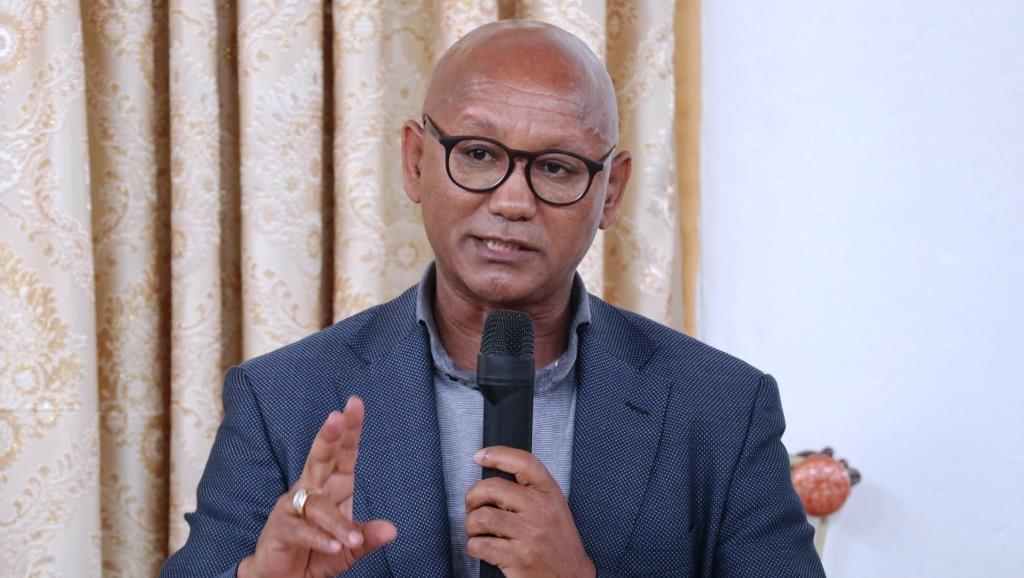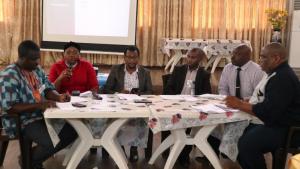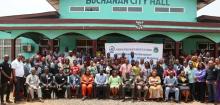Has the National Public Health Institute and Partners kept the Liberia people safe from health emergencies 2 years after the Ebola outbreak?
 To answer this question, the National Public Health Institute of Liberia (NPHIL), the Ministry of Health (MoH), and stakeholders of Liberia’s health system gathered in Buchanan, Grand Bassa County from March 4 to 8, 2019 to review NPHIL’s 2018 performance, challenges and plans for the current year (2019). This year’s theme was, “Strengthening Public Health Practice, Resilience and Health emergencies response in Liberia”.
To answer this question, the National Public Health Institute of Liberia (NPHIL), the Ministry of Health (MoH), and stakeholders of Liberia’s health system gathered in Buchanan, Grand Bassa County from March 4 to 8, 2019 to review NPHIL’s 2018 performance, challenges and plans for the current year (2019). This year’s theme was, “Strengthening Public Health Practice, Resilience and Health emergencies response in Liberia”.
As lessons learned from the 2014-2016 EVD epidemic, to prevent future emerging and re-emerging epidemics, there was a need to build a resilient system in detecting and preventing epidemics. Against this background, in 2015, the Ministry of Health developed the Investment Plan for Building a Resilient Health System. Pillar three emphasized building public health capacity for disease prevention, detection, preparedness, surveillance and response to public health threats which in turn give birth to the National Public Health Institute of Liberia in 2017.
The main achievements of 2018 ranged from capacity building of surveillance officers through the Field epidemiology training program (FETP) and Integrated disease surveillance and response (IDSR); turn-around time in laboratory diagnosis, increased in laboratory testing capacity for priority diseases in the country, strengthened food and water safety monitoring, research initiatives and improved epidemics preparedness and timely response to disease outbreaks/public health events. These achievements according to NPHIL’s were attained with the strong government political will and leadership; strong partnerships, one health approach, community engagement and support from both international and national partners.
Challenges highlighted included inadequate health workforce, low remunerations of health workers, staff attrition, weak community based surveillance system, low vaccination coverage, inadequate laboratory and diagnostic capacity at subnational level, weak supply chain system, weak health information and research systems, inadequate pharmaceutical regulation, environmental and sanitation services especially in the peri-urban and slum areas.
The review was attended by over 200 participants representing different institutions, including the 54th Legislature, the Ministry of Health (MOH), National Public Health Institute of Liberia (NPHIL), Ministry of Agriculture (MOA), the United States Centers for Disease Control and Prevention (CDC), World Health Organization (WHO), the World Bank, the National Institutes of Health (NIH), Riders for Health, USAID, UNICEF, FAO, GIZ amongst others.
Addressing the opening session, Hon. Tolbert G. Nyenswah, Director General of NPHIL, provided the objectives of the review as intended to critically analyze the 2018 health security and emergencies performance, define the appropriate course of action to be perused in 2019 to sustain the gains made, mitigate the challenges and enhance the operations of NPHIL. Hon. Nyenswah reiterated the need for providing concrete recommendations to propel the institute to attain its program objectives of protecting the Liberian people from health emergencies. He then commended partners working with NPHIL for their support to the institute and requested continuity.
Senator Dr. Peter S. Coleman, Chairman on the House’s Committee on health emphasized the need to sustain the post-Ebola gains through accountability, ownership, and the promotion of the Pro-Poor Agenda for Prosperity and Development. He stressed the need to address the national policy of free drugs where the drugs will be available and affordable. He requested the Ministry of Health to revisit the government free health care policy with the view of addressing the current prevailing situation of the continued stock out of drugs at health facilities throughout the country. He pledged the continued lobbying for an increase of budgetary allotment to NPHIL and Ministry of Health.
The World Bank representative Mrs. Munirat Iyabode Ogunlayi, indicated the support of World Bank to the health sector of Liberia, highlighting the REDISSE Project which is aimed at strengthening laboratory capacity, surveillance, epidemic preparedness and response to outbreaks.
Dr. Desmond Williams, Country Representative of the US Center for Disease Control and Prevention, called for the urgent rollout of electronic IDSR platform to all the 15 counties to enhance real-time reporting and response to public health events. He requested the Government of Liberia to take the lead in terms of support to the health sector amidst the current scale down of donor funding.
Dr. Mesfin Gebrekidan Zbelo, WHO Representative (a.i.), in his remarks called for the resilience of the health sector amidst limited resources. He noted that this will require government stewardship at all levels, the availability of trained and adequate human resources for health, improved health facilities, logistics, and supplies as well as the required level of funding to support the resilience of the health sector. He further admonished partners to assist the ministry in exploring other alternative sources of financing the health sector given the prevailing declined of support, especially from external sources.
At the end of the review meeting, all stakeholders committed themselves to support NPHIL and MoH in the implementation of the key recommendations that include; the demographic health survey (DHS) with the added EVD and Hepatitis sero survey, investment in health Systems strengthening, operational research, roll-out of eIDSR, 3rd edition IDSR technical guidelines, revised IPC guidelines to 15 counties, strengthen the HMIS by linkage with eIDSR, epidemics preparedness and response, essential medical supplies, capacity building in key thematic areas, disease-specific contingency plans, operationalize the National Action Plan for Health Security under one health platform, reviewing and functionalizing the County Emergency Operations Center and rapid response teams; Coordination at all levels to reduce maternal and infant deaths and strengthening the National Supply Chain System.
Epi-Surveillance/IDSR Team Lead
WHO-Liberia
+ (231)776106795
drmondayj [at] gmail.com (drmondayj[at]gmail[dot]com)
Health Information and Promotion officer
Tel : +(231) 776532008
Email: lakev [at] who.int (lakev[at]who[dot]int)





